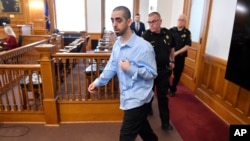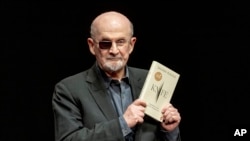Lawyers began delivering opening statements Monday at the trial of the man charged with trying to fatally stab author Salman Rushdie in front of a lecture audience in western New York.
Rushdie, 77, is expected to testify during the trial of Hadi Matar, bringing the writer face-to-face with his knife-wielding attacker for the first time in more than two years.
Rushdie, the Booker Prize-winning author, had been about to speak about keeping writers safe from harm in August 2022 when Matar ran toward him on the stage at the Chautauqua Institution Amphitheater. Matar stabbed Rushdie more than a dozen times in the neck, stomach, chest, hand and right eye, leaving him partially blind and with permanent damage to one hand.
The Indian-born British-American author detailed the attack and his long, painful recovery in a memoir, "Knife: Meditations After an Attempted Murder," released last year. Rushdie had worried for his safety since his 1989 novel "The Satanic Verses" was denounced as blasphemous by many Muslims and led to Iran's Ayatollah Ruhollah Khomeini issuing a fatwa calling for his death.
Rushdie spent years in hiding, but had traveled freely over the past quarter century after Iran announced it would not enforce the decree.
The trial is taking place as the 36th anniversary of the fatwa — Feb. 14, 1989 — approaches.
Matar, 27, of Fairview, New Jersey, is charged with attempted murder and assault. He has pleaded not guilty.
A jury was selected last week. Matar was in court throughout the three-day process, taking notes and consulting with his attorneys. He calmly said, "Free Palestine" while being led in to court Monday past members of the media taking photographs and video.
Matar's defense faced a challenging start after it was announced that his lawyer, Nathaniel Barone, was hospitalized with an undisclosed illness and would not attend the start of the trial.
Judge David Foley refused a defense request to postpone opening statements, instead instructing an associate of Barone to deliver the defense's opening statement in his place.
Once testimony is underway, the trial is expected to last a week to 10 days. Jurors will be shown video and photos from the day of the attack, which ended when onlookers rushed Matar and held him until police arrived.
The event's moderator, Henry Reese, co-founder of City of Asylum in Pittsburgh, was also wounded. Matar told investigators he traveled by bus to Chautauqua, about 120 kilometers south of Buffalo. He is believed to have slept in the grounds of the arts and academic retreat the night before the attack.
Matar's attorney has not indicated what his defense will be. In a separate indictment, federal authorities allege Matar was motivated by a terrorist organization's endorsement of a fatwa, or edict, calling for Rushdie's death.
A later trial on the federal charges — terrorism transcending national boundaries, providing material support to terrorists and attempting to provide material support to a terrorist organization — will be scheduled in U.S. District Court in Buffalo.
Rushdie has been one of the world's most celebrated authors since the 1981 publication of "Midnight's Children," winner of the Booker Prize. His other works include the novels "Shame" and "Victory City," which he had completed shortly before the 2022 stabbing, and the 2012 memoir "Joseph Anton," in which he wrote about his time in hiding.
In the federal indictment, authorities allege Matar believed the edict was backed by the Lebanon-based militant group Hezbollah and endorsed in a 2006 speech by the group's then-leader, Hassan Nasrallah.

